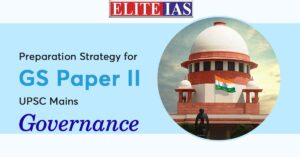
Prelims Exam: As you approach your prelims exam of UPSC, it’s essential to focus on efficient and effective studying strategies to maximize your preparation in the limited time remaining. Here’s a suggested plan by Elite IAS coaching in Delhi for the three days leading up to your exam:
Day 1: Revision and Consolidation
Look over your study notes: Go through the short notes you made while studying. These notes should have the main points, formulas, and facts for your exam. Reviewing these notes helps you remember important concepts. Make sure your notes are clear and brief so you can quickly refer to them while studying. This step refreshes your memory and makes sure you understand the material well.
Revise each subject separately: Spend time revising each subject or section of your syllabus one by one. Start with the subjects you feel most confident about to boost your confidence. Then, focus on the topics you find more challenging. This method helps you cover everything in your syllabus and gives more time to difficult topics. Revisiting each subject strengthens your understanding and fills any knowledge gaps.
Practice with mock tests: Take practice tests that are similar to the real exam. If you are member of any online coaching for UPSC, they provide such tests. This helps you get used to the exam conditions and see how well-prepared you are. It also helps identify areas where you need to improve. Analyzing your performance helps you know your strengths and weaknesses so you can adjust your study plan. Doing regular practice tests builds confidence and improves your time management skills.
Quickly review current affairs notes: Read through recent news or summaries to stay updated with the latest events. Pay attention to news related to your exam, especially those close to the exam date. This helps reinforce your knowledge of current affairs and prepares you for related exam questions. Being informed about recent events shows your awareness and improves your overall preparation.
Take care of yourself: Make sure to prioritize your well-being while studying. Get enough rest because sleep is important for thinking clearly and remembering things. Drink enough water and eat balanced meals to keep your body and brain fueled. Managing stress is also crucial, so try relaxation techniques like light exercise or meditation. Taking care of your physical and mental health is essential for studying effectively and performing well in exams.
Day 2: Intensive Revision
Work on What’s Hard: Find the topics you’re not so sure about and focus on them first when you study again. Spend extra time breaking down these tough parts into simpler bits and clear up any questions you have. Try different ways of learning like solving problems or drawing out diagrams. Talk to your friends or teachers if you need help. By giving more attention to the tricky stuff, you’ll understand better and feel more confident overall.
Practice with Time Limits: When you practice, set strict time limits like in the real exam. This helps you get used to managing your time well during the test. Practicing with time limits helps you decide which questions to do first, manage your time wisely, and figure out the best ways to solve different types of problems quickly. Doing this regularly makes you faster, more accurate, and better at handling the pressure of timed exams.
Focus on Each Subject: Plan out your study time for each subject or part of the exam. Make sure you cover all the important ideas, formulas, and ways to solve problems for each subject. Use textbooks, notes, or online lessons to learn more about each subject. Breaking your study time into smaller parts helps you go through everything you need to know, fix any parts you’re not sure about, and get really good at all the subjects you’ll be tested on.
Learn from Practice Tests: Look back at how you did on practice tests or test series for UPSC and think about what you got wrong. See if there are any patterns or if you keep making the same mistakes. Try to figure out why you made those mistakes. Was it because you didn’t understand something, misunderstood the questions, or didn’t manage your time well? Make a note of what you need to improve and come up with ways to fix those mistakes. Use the feedback from practice tests to focus on the things you’re not so good at and to find better ways to solve problems. Learning from your mistakes helps you do better in the real exam.
Keep a Positive Attitude: Stay positive while you study and believe in yourself and your efforts. Picture yourself doing well in the exam and reaching your goals. Focus on how much you’ve already accomplished, recognize your strengths, and celebrate your progress. Surround yourself with supportive friends, teachers, or study buddies who encourage you when things get tough. Having a positive mindset helps reduce stress and worry and keeps you motivated and strong enough to overcome any challenges on exam day.
Day 3: Final Preparation and Relaxation : Prelims Exam
Last-minute Review: Three days before your exam, focus on going over what you already know instead of trying to learn new things. Look at important formulas, key concepts, and memory tricks you’ve learned before. Keep this session short and targeted so you don’t overwhelm yourself.
Practice Test: Doing another practice test now is important for a few reasons. It helps you feel what the real exam will be like, so you can get used to the time pressure and stress. It also shows you where you might need to study more. Plus, it boosts your confidence by showing you how prepared you are and getting you used to the test format.
Relaxation: Feeling stressed before a big test is normal. Using relaxation techniques can really help. Try deep breathing, tensing and relaxing your muscles, or listening to calming music. Spend some time doing these to help you feel calm and focused for the exam.
Get Ready for the Exam: Make sure you have everything you need for exam day organized and ready to go. This includes your ID, admission ticket, pens, pencils, erasers, and anything else you’re allowed to bring. Being prepared ahead of time helps you start the exam day smoothly without any last-minute stress.
Rest Up: It’s important to get a good night’s sleep before the exam. Sleep helps your brain work well and remember things. Try to have a relaxing bedtime routine to help you unwind and get ready for sleep. Don’t stay up late studying or worrying about the exam. Trust that your preparation has you ready, and a good night’s sleep will help you perform your best on exam day.
However, maintaining confidence and trust in your preparation is crucial as you approach the exam. Keep a calm and focused mindset, avoiding unnecessary pressure. Remember, you’ve put in the effort, and now it’s time to showcase your abilities. Stay composed, tackle each question methodically, and give your best effort. With determination and a positive attitude, success is within reach.
Best of luck!



